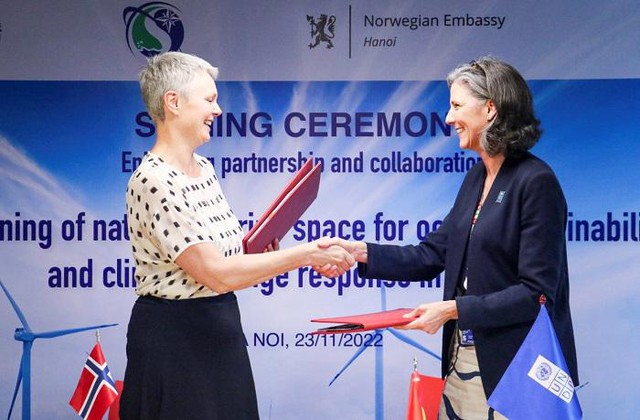UNDP, Norway help Viet Nam implement maritime spatial planning
VGP - The United Nations Development Program (UNDP) and the Norwegian Embassy in Ha Noi have teamed up to assist the Vietnamese Government in strengthening and implementing maritime spatial planning.

UNDP Resident Representative in Viet Nam Ramla Khalidi (R) and Norwegian Ambassador to Viet Nam and Lao PDR Hilde Solbakken sign an agreement to support planning of maritime space for ocean sustainability and climate change response in Viet Nam, Ha Noi, November 23, 2022
The deal was reflected by the two sides signing on Wednesday an agreement to support planning of maritime space for ocean sustainability and climate change response in Viet Nam.
This technical assistance package will assist Viet Nam in creating and establishing a more rational use of marine space and the interconnections between its uses, balancing the need for growth with the need to maintain marine ecosystems and achieving social and economic goals in an open and organized manner.
This endeavor aims to promote a cross-sectoral approach to the management of economic, environmental, and social concerns in strategic planning and long-term investments.
The technical assistance package will take place at central level and in three sites at local level. The sites were selected based on the following criteria, namely a small eco-region with the potential for a practical solution; political and administrative support; the availability of a reasonable amount of spatial biophysical data and information of critical resources; and a competent and willing authority to develop and implement the marine spatial plans.
Viet Nam is a coastal country with more than one-third of the population living in coastal areas. The economy of the sea, coastal provinces, and cities account for approximately 50 percent of the country's gross domestic product (GDP), with the marine economy alone contributing 20 to 22 percent.
However, Viet Nam's ocean health is threatened by habitat fragmentation, degradation, loss, fishing and other kinds of overexploitation, climate change, and pollution, mainly marine litter. Marine resources, including coral reef, has been experiencing degradation and dramatic decrease.
Addressing the event, UNDP Resident Representative in Viet Nam Ramla Khalidi said that the Ocean provides significant opportunities for a green and blue economic rebound and offers great potential for onshore and offshore wind power, which, if sustainably developed, will support energy security and help Viet Nam meet its commitment of net zero emissions by 2050.
UNDP will continue to accelerate and strengthen the work on marine spatial planning, which is vital to unlocking the potential of the Blue Economy, and in particular to leverage Viet Nam's enormous potential for marine wind energy as a key renewable power source for the country's climate target, she added.
The three-year technical assistance package will accelerate progress in marine spatial planning by emphasizing the promotion of research, technology transfer, and innovation in the marine sector. It will conduct integrated planning that promotes sustainable marine development in the target province areas.
